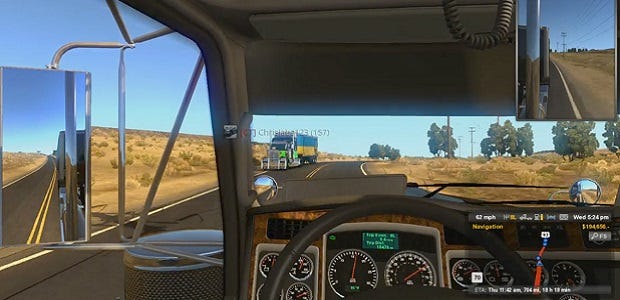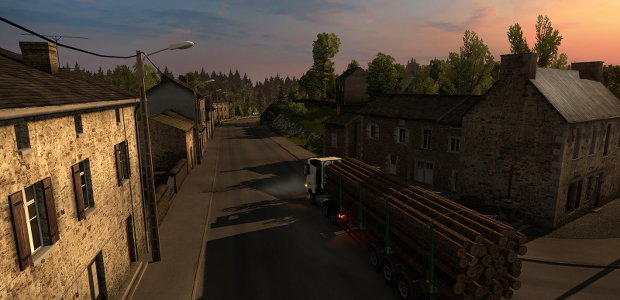Hitting The Virtual Roads Of Euro And American Truck Simulator With Retired Truckers
Haul of fame
Truck driving games like American Truck Simulator [official site] and Euro Truck Simulator 2 [official site] are popular because they offer a routine, almost meditatively romantic simplicity — there's no lengthy checklist of deadlines to meet and stakeholders to please, no paperwork, no family to feed, no monsters to slay, nor anything else to raise your heartrate. Just you, the open road, and a cargo to haul somewhere.
For one group of players, however, the escapism offered by truck sims goes to another level. It's not just an escape from the chaos and stress of their everyday life, but also an escape into a former life. For retired truckers, truck sims are a way to return to life on the road — a life they loved. In virtual form.
Some lifelong truckers retire because they're old, of course, and at age 60/70/80-something they've decided it's time to call it a day. But many are forced to retire due to injury — either from an accident or from the repetitive strain of hauling big rigs long distance day after day for years. Truck sims are a chance for these guys and gals to get back on the open road without having to deal with the shit that comes with it in real life.
Others retire for family or safety reasons. Trucking can be dangerous — I found one former military trucker who drove in warzones for much of his career — and it's often taxing on relationships or home life, since long-haul truckers are gone weeks or months at a time. I get a strong sense of this from my discussion with a guy who calls himself Cappy.
Cappy says he stopped driving because he had "a whole shitload of kids," the last of whom are just graduating now, and he wanted to be closer to his family. (And "there's no money" in short hauls around the city.) He's only semi-retired — once the kids have their post-school lives somewhat in order he'll be getting back on the road, this time with his wife in tow. "It takes a special woman to be a trucker's wife," Cappy says, and he's lucky that his wife not only appreciates his passion for the open road but also wants to clock a few miles of her own.
Cappy was "conceived in the bunk of a truck" by a father who was a career trucker and a mum who waitressed at a truck-stop. He started his own trucking life in Canada working in a shunt yard backing trailers into docks, then got his trucking license (an annoying complication required "for insurance reasons") so he could start driving for his dad's company. He spent most of his career driving long-haul jobs for a small Californian company based in a place called Canyon Lake. ("A small mom and pop thing", with "like 30 trailers but eight trucks.") Here he says he had a great thing going, with a boss that let employees crash at his house and drive his cars or even go for boat rides when they were in town.
Cappy likens trucking to being a paid tourist: "You want to see the world's largest ball of string? Then you just tell the guy that you work for that you want to see the world's largest ball of string, and he books you a load there."
He's playing American Truck Simulator while we chat over TeamSpeak. He ends almost every sentence with "right?" like we're on CB radio. He's logged over 840 hours on the game since its release in February, which is comparable to the hours a typical full-time worker has put into their job over the same period. I ask him what it's like being a real trucker. "It's kind of like what I'm doing right now," he says. "You're looking at it through the windshield. You're seeing stuff that's different all the time. Even though you go up and down the same road all the time it's always something different."
"There's always a different dumbass on the street or you'll see some guy dancing on the street corner for just no reason other than he's half drunk or half stoned or both, or just plain stupid. Or he could just be having a good time. There's always something different to see. That's what I always liked."
Cappy thinks he's covered about 90 percent of the trucking roads and highways and side streets in the United States and Canada in his lifetime ("I've got over three million miles," he notes, "so I've covered a lot of freakin' roads."), so he's no stranger to the surreal experience of driving on a road in-game that he knows well in real life. Most of the time he's cool with that, and like all the other former truckers I found he's upbeat about how well the game captures the essence of real truck driving, but he's quick to concede it's far from perfect.
For one thing, the truck stops and fuel stations are all wrong. Real North American truck stops don't have arrows on the road, for instance. "You can drive whichever way you want in the parking lot," he says. "It doesn't matter here. Just find a spot, and get out of the way of everybody else. That's all we want as truck drivers. We don't care which way you're going. Just go!"
Cappy also points out that trucks often aren't equipped appropriately for the type of trailer you're hauling, or there's a key step missing: "If I'm hauling a gravel trailer out to a roadside construction zone, if I pull up and drop a trailer at a construction yard and the trailer is a dump trailer with gravel in it, how are they going to get the gravel out with no goddamn truck there?" Shovel it off by hand, he suggests a little later, laughing.
He'd love to be able to have his character sleep somewhere other than a motel, too. He often slept on a bunk in his truck. And to have the option get out and do circle checks of the truck. Or to have extra pivot points so that trucks can carry multiple trailers. Or actual axle weights so that the weigh scales have a purpose. Things that "give that extra realness."
American Truck Simulator gets most of the trucking experience right, it seems, but it's missing these small touches of authenticity. Cappy also keeps pointing out the exact same broken-down truck on the side of the road with an axle bent in just the same way — an unfortunate immersion-breaking niggle that was likely due to development budget constraints.
I found similar complaints from other former truckers, usually phrased in similar "great game but..." lines. Retired European trucker Roger, who goes by the handle dodger, told me his only qualm with Euro Truck Simulator 2 is that "perhaps they could have done with more routes in the UK." Otherwise it's "very lifelike" and "gives a good flavour" of the trucking life. He particularly digs the way it has rain, which can turn to mist, and includes a day/night cycle complete with a beautiful sunrise and sunset.
Now 74, dodger started trucking back in the 1960s. He's driven the real-life equivalent of almost every route in the game and then some — he also drove in France and Italy, neither of which are in ETS2 yet. He sent me a link to a YouTube video from Euro-Trucks.org that captures the feel of a route he used to drive "all the time" from Dover to coastal Belgian village Zeebrugge. (His personal driving style he likens more to American trucker Indiana Jack, however.)
Dodger doesn't exactly share Cappy's view of trucking as paid tourism. "You travel to all these countries but most of the time you do not have time to see them," he said. "It's not like being on holiday!"
He did note, however, that part of the appeal is that you're the only one to get the job done. This gels with something Cappy says to me. "When I'm in the yard, at the office, at the customer's, at the shipper's, I belong to the company," he explains. "As soon as I pull away from all those places I work for me, and me only. I make sure that the load gets there on time because I want to."
"If I want the load to be late I can make the load late. I never did, but it was one of those things where you become the boss. You're in control. And that's almost like a power-hungry kind of thing."
As in the games, real truckers have clients and bosses to answer to at each end of the route, but in between they decide what to do. Which is perhaps why this job works so well as a game — you, the driver, have complete agency over how and indeed if you complete the mission.
And if you're long-hauling — which Cappy says is where the best money is — then you can be a journeyman. A gypsy. A romantic, driven to roam the continent in search of fortune and experience. "Like a part of the circus," Cappy says. "You show up, do what you got to do, and then you get the hell out. Go and do it again in another place." A trucker's life is that of a wanderer, and what better do open-world games do than enable wandering?
That said, I noted with some curiosity that many of the retired truckers I found tend to play the SCS truck sims with mods that try to make the experience more authentic. One element in particular seems to be missing from the games' vanilla flavours: other people. Multiplayer.
Cappy only plays ATS in the community-made multiplayer mod. "Trucking is a social thing," he says. "You've gotta have some social skills to be a truck driver." He thinks multiplayer should be part of the core game — a kind of non-violent, trucking-only version of GTA Online or The Crew where you see and interact with and even conduct business with other players.
I can see the appeal of a trucking MMO as we're talking. As I ride along with Cappy I see dozens of other trucks on the road, bristling this way and that (and in typical online videogame form often flouting the road rules). The world seems so much more alive than when I play alone. Meanwhile he keeps in radio contact with his buddy Chevy756 over TeamSpeak. They intermittently share their respective locations and the sights and sounds of the road or where their next job has them headed.
I've come to realise that the beauty of trucking — real or virtual — is not simply in the romance of just you and the open road, a world at your feet, but also of the other people. The camaraderie of CB radio chatter and the truck-stop stories and all the weird and wonderful people you see and meet along the way. Truck sims capture so much of the trucking experience so brilliantly, but in nailing the meditative isolation of long-hauling around the continent SCS overlooked one crucial part.
When we dream of getting out of the truck to stop at a roadside café and soak in the sights and sounds, maybe we're really just looking for a deeper connection to this world that looks from our truck cabins to be so full of possibility. Maybe we just want people, and the stories that they bring.







